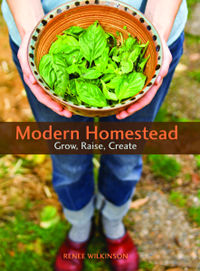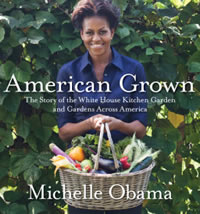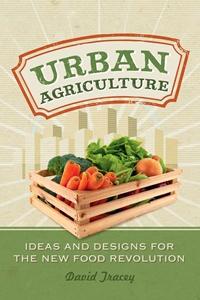Links to articles on composting, worms, food gardens, and the political side of city farming. (Vancouver, B.C.)
Keyword: Urban agriculture
Modern Homestead : Grow, Raise, Create
 Drawing a parallel with the homesteaders who settled the Oregon frontier, Portland author Renee Wilkinson recognizes that same spirit–and lack of knowledge and experience–in today’s pioneers seeking self-sustaining, urban homes. Modern Homestead is not an A-Z encyclopedia of vegetable crops, but instead provides general rules-of-thumb to help you decide what you want, including a sizeable portion of the book that is given over to “Citified Creatures.” Preserving your harvest is important, too, but the strongest message is don’t work alone. Find some buddies to help you with your homestead, and you will collectively be more innovative and much more successful.
Drawing a parallel with the homesteaders who settled the Oregon frontier, Portland author Renee Wilkinson recognizes that same spirit–and lack of knowledge and experience–in today’s pioneers seeking self-sustaining, urban homes. Modern Homestead is not an A-Z encyclopedia of vegetable crops, but instead provides general rules-of-thumb to help you decide what you want, including a sizeable portion of the book that is given over to “Citified Creatures.” Preserving your harvest is important, too, but the strongest message is don’t work alone. Find some buddies to help you with your homestead, and you will collectively be more innovative and much more successful.
Excerpted from the Winter 2013 Arboretum Bulletin.
American Grown
 First Lady Michelle Obama’s new book, American Grown: The Story of the White House Kitchen Garden and Gardens Across America (Crown Publishers, 2012) has much to say about gardening as a learning process. A novice gardener, she doesn’t hesitate to admit that not all of the Kitchen Garden efforts succeeded on the first try: there were raised berms that succumbed to foot traffic and were replaced with untreated wooden boxes, troubles with cutworms, and trials and tribulations with pumpkins. But her motivation to create a food garden on the South Lawn with the participation of numerous horticulturists, chefs, and schoolchildren, has resulted in a beautiful, productive example for every aspiring urban farmer (even someone without a staff of dozens or a large growing space!).
First Lady Michelle Obama’s new book, American Grown: The Story of the White House Kitchen Garden and Gardens Across America (Crown Publishers, 2012) has much to say about gardening as a learning process. A novice gardener, she doesn’t hesitate to admit that not all of the Kitchen Garden efforts succeeded on the first try: there were raised berms that succumbed to foot traffic and were replaced with untreated wooden boxes, troubles with cutworms, and trials and tribulations with pumpkins. But her motivation to create a food garden on the South Lawn with the participation of numerous horticulturists, chefs, and schoolchildren, has resulted in a beautiful, productive example for every aspiring urban farmer (even someone without a staff of dozens or a large growing space!).
For readers who want to cultivate a closer relationship to the source of the food we eat (either by growing our own or by supporting small farms), this book is a good starting point. The book, which opens with a brief history of gardens at the White House, is arranged by season, and includes plans, descriptions of techniques and hands-on growing experiences, and recipes. Various experts on the garden staff contribute parts of the text. Seattle makes two appearances in the section on “How Our Gardens Grow Stronger Communities,” with a page on Picardo Farm P-Patch, and a historic photo of Pike Place Market. The book ends with a resource list and bibliography.
If you are curious about the source of initial hesitation/opposition to the first White House beehive ever, here’s a hint: the beehive is sited not far from the basketball court!
Urban Agriculture
 Though I personally am cheered by the sight of a P-Patch, a front garden, or a tiny apartment balcony resplendent with edible plants, there is still resistance to seeing raised beds replete with tomatoes and lettuce overtake a lawn or other underutilized space. Activist and arborist David Tracey’s Urban Agriculture: Ideas and Designs for the New Food Revolution opens with an account of conflict over creating a community garden in his native Vancouver, B.C. Despite this negative note, the book is an antidote to despair. Tracey’s informal and humorous style diminishes the sense of helplessness we feel in the face of corporate control over our food supply, and its attendant environmental devastation and cost to human health. Tracey does not provide detailed directions on how to grow various vegetables from seed, or how to make your own compost; his purpose is to inspire and empower the reader to begin or continue the worthwhile work of growing food (as opposed to “fuud,” the term he coins for the products of Big Ag). You may not think you are engaged in agricultural pursuits but by the author’s definition, anyone who grows edible plants is a farmer.
Though I personally am cheered by the sight of a P-Patch, a front garden, or a tiny apartment balcony resplendent with edible plants, there is still resistance to seeing raised beds replete with tomatoes and lettuce overtake a lawn or other underutilized space. Activist and arborist David Tracey’s Urban Agriculture: Ideas and Designs for the New Food Revolution opens with an account of conflict over creating a community garden in his native Vancouver, B.C. Despite this negative note, the book is an antidote to despair. Tracey’s informal and humorous style diminishes the sense of helplessness we feel in the face of corporate control over our food supply, and its attendant environmental devastation and cost to human health. Tracey does not provide detailed directions on how to grow various vegetables from seed, or how to make your own compost; his purpose is to inspire and empower the reader to begin or continue the worthwhile work of growing food (as opposed to “fuud,” the term he coins for the products of Big Ag). You may not think you are engaged in agricultural pursuits but by the author’s definition, anyone who grows edible plants is a farmer.
The book is explicitly organized from the smallest to largest scale of edible cultivation (sprouts on the kitchen counter to full-scale farming). There are some unusual inclusions here, such as sections on aquaponics (in case you want to grow fish and greens together!) and school farms, the self-sufficiency model of Cuba’s urban farming project, and a checklist of questions to ask politicians before the next election (ask where she or he stands on the use of public space to grow food by raising the concept of usufruct, the legal right to use and enjoy the fruits or profits of something belonging to another). There are numerous quotable lines in this book, such as: “It takes food to grow a village,” and “The seed knows what to do.” The library also has his previous book, Guerrilla Gardening: A Manualfesto.